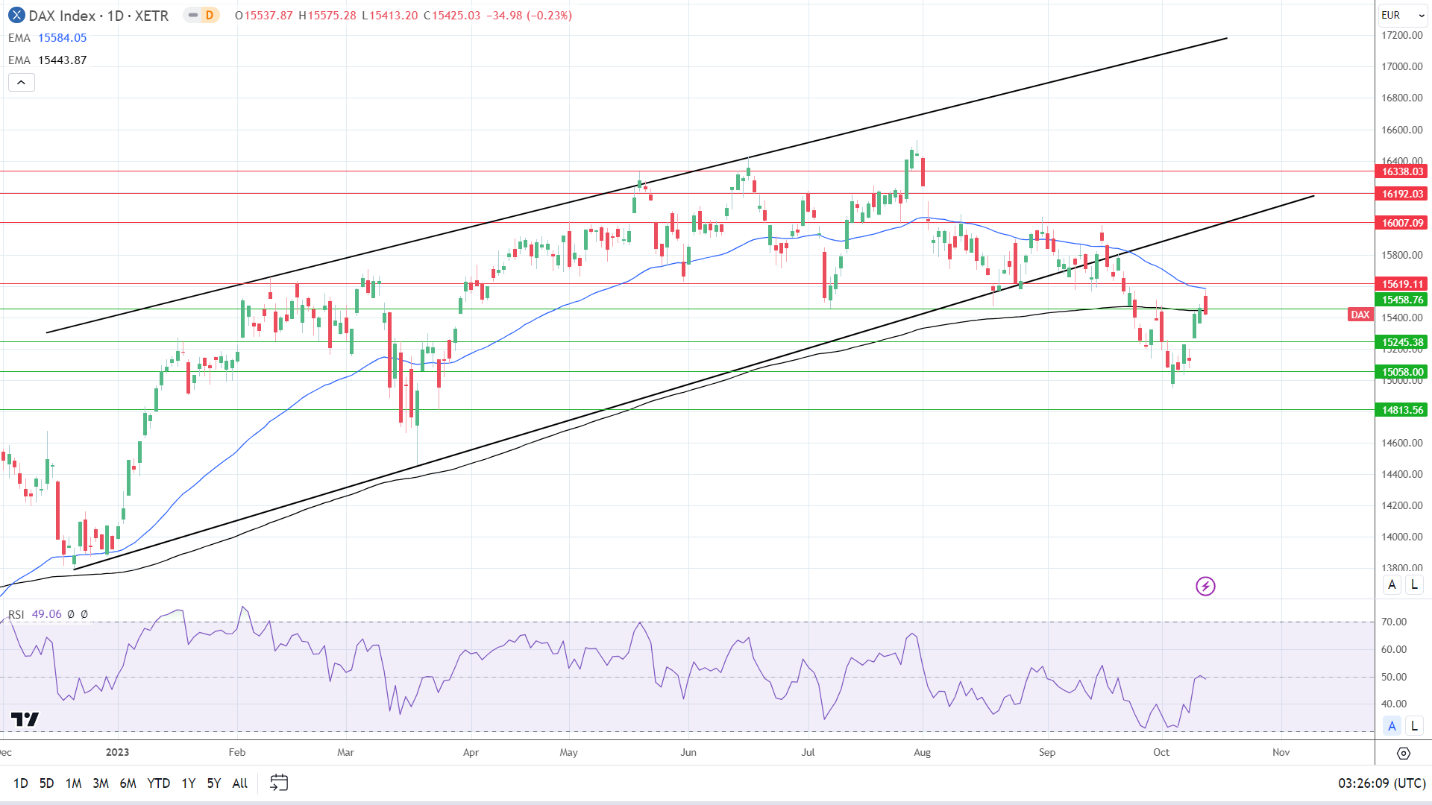Dax: Bundestag Elections And Economic Indicators

Table of Contents
Historical Correlation between Bundestag Elections and DAX Performance
Analyzing past election cycles reveals a complex relationship between Bundestag elections and DAX performance. While no single pattern consistently emerges, several trends are observable. The months leading up to an election often witness increased market volatility as investors react to shifting political landscapes and the uncertainty surrounding potential policy changes.
The period immediately following the election can also be volatile, depending on the clarity of the election result and the speed of coalition formation. A decisive victory often leads to greater market stability than a close election requiring prolonged coalition negotiations.
- 2017 election: A slight dip in the DAX was observed in the weeks leading up to the election, followed by moderate growth in the subsequent months. The relatively clear outcome contributed to investor confidence.
- 2013 election: Increased volatility characterized the months leading up to the 2013 election, reflecting uncertainty surrounding the potential outcomes and coalition possibilities.
- 2009 election: The global financial crisis significantly overshadowed the election's impact on the DAX, resulting in a more subdued market reaction compared to other elections. However, a subsequent recovery was observed following the formation of a stable government.
Analyzing these historical data points, expressed as percentage changes in the DAX, allows for a better understanding of typical market reactions to Bundestag elections. Precise data requires accessing historical DAX performance charts and financial news archives from the relevant periods.
Factors Influencing DAX Movement During Election Periods
Several key factors influence DAX movement during Bundestag election periods. Understanding these factors is crucial for navigating the market effectively.
Political Uncertainty: The period leading up to an election is often marked by heightened political uncertainty. Investors react negatively to this uncertainty, often leading to increased market volatility and potentially lower share prices. The closer the election and the less clear the projected outcome, the greater the uncertainty and resulting market fluctuations.
Coalition Negotiations: Prolonged coalition negotiations following a closely contested election can further amplify market instability. Uncertainty about the composition of the next government and its potential policy agenda creates a climate of uncertainty that can negatively impact investor confidence and DAX performance. The longer the negotiations, the greater the potential for negative market impact.
Policy Expectations: The economic platforms of different political parties significantly influence investor expectations. Parties with fiscally conservative platforms may be viewed favorably by investors, while those advocating for significant social programs might trigger market concerns about increased government spending and potential inflation.
- Impact of potential tax reforms: Tax reforms proposed by different parties can significantly impact specific DAX sectors. For example, changes to corporate tax rates can have a substantial effect on the performance of large corporations listed on the DAX.
- Influence of proposed environmental policies: Proposed environmental policies, especially those impacting energy production and consumption, can significantly influence the performance of energy companies listed on the DAX.
- Effects of differing stances on European Union policies: Differing stances on EU policies, especially those impacting trade and economic integration, can influence investor sentiment towards German companies with significant international operations.
Analyzing Key Economic Indicators Before and After Bundestag Elections
Monitoring key economic indicators provides additional context for understanding DAX performance during election periods.
GDP Growth: Strong pre-election GDP growth generally reflects a healthy economy and usually supports positive investor sentiment. Conversely, slowing GDP growth can create concerns about economic prospects and negatively impact the DAX.
Inflation Rates: Rising inflation can erode purchasing power and potentially impact consumer spending. High inflation rates often lead to increased uncertainty and volatility in the DAX. Central bank responses to inflation, such as interest rate hikes, can further influence market behavior.
Unemployment Rates: Low unemployment rates usually indicate a strong labor market and healthy consumer confidence, generally supporting positive DAX performance. Rising unemployment figures can create negative sentiment and potential market downturns.
- Correlation between GDP growth and DAX performance: Analyzing historical data reveals a positive correlation between GDP growth in the year leading up to elections and DAX performance in the year following the election.
- How rising inflation affects investor behavior: Rising inflation often leads to investors seeking assets that protect against inflation, potentially causing shifts in investment portfolios and influencing DAX performance.
- The impact of unemployment figures: Changes in unemployment figures directly affect consumer spending and business confidence, both of which significantly influence DAX performance.
The Role of International Factors
Global economic events and geopolitical factors can significantly influence the DAX, irrespective of domestic political events. For instance, a global recession or a major geopolitical crisis can easily overshadow the impact of a Bundestag election on the DAX. These external factors can interact with the domestic political climate to produce complex and unpredictable market outcomes.
DAX, Bundestag Elections, and Informed Investment Strategies
Understanding the intricate relationship between the DAX, Bundestag elections, and key economic indicators is crucial for investors. While predicting the precise market impact of elections is impossible, monitoring key indicators and understanding historical trends allows investors to make more informed decisions.
Investors should consider diversification strategies to mitigate risks associated with election-related volatility. Monitoring key economic indicators, such as GDP growth, inflation rates, and unemployment figures, is essential for assessing the overall health of the German economy and its impact on the DAX. Staying informed about the political landscape and the policy platforms of different parties can also improve investment decision-making.
Stay informed about the DAX and Bundestag elections, monitor key economic indicators impacting the DAX, and develop a robust investment strategy considering the influence of Bundestag elections on the DAX to make the most informed investment decisions.

Featured Posts
-
 Indian Wells 2024 Caida Inesperada De Una De Las Principales Candidatas
Apr 27, 2025
Indian Wells 2024 Caida Inesperada De Una De Las Principales Candidatas
Apr 27, 2025 -
 The Professionals Behind Ariana Grandes Striking New Hair And Tattoos
Apr 27, 2025
The Professionals Behind Ariana Grandes Striking New Hair And Tattoos
Apr 27, 2025 -
 Posthaste Job Cuts Predicted In Canadas Auto Industry Due To Trumps Escalating Tariffs
Apr 27, 2025
Posthaste Job Cuts Predicted In Canadas Auto Industry Due To Trumps Escalating Tariffs
Apr 27, 2025 -
 Ariana Grandes Bold New Look Hair Tattoos And Professional Styling Choices
Apr 27, 2025
Ariana Grandes Bold New Look Hair Tattoos And Professional Styling Choices
Apr 27, 2025 -
 Ariana Grandes Transformation Why Professional Help Matters For Hair And Tattoos
Apr 27, 2025
Ariana Grandes Transformation Why Professional Help Matters For Hair And Tattoos
Apr 27, 2025
Latest Posts
-
 Understanding Ariana Grandes Style Choices Hair Tattoos And Professional Guidance
Apr 27, 2025
Understanding Ariana Grandes Style Choices Hair Tattoos And Professional Guidance
Apr 27, 2025 -
 Hair And Tattoo Transformations Learning From Ariana Grandes Style
Apr 27, 2025
Hair And Tattoo Transformations Learning From Ariana Grandes Style
Apr 27, 2025 -
 Ariana Grandes Bold New Look The Role Of Professional Expertise
Apr 27, 2025
Ariana Grandes Bold New Look The Role Of Professional Expertise
Apr 27, 2025 -
 Celebrity Style Transformation Ariana Grandes Hair And Tattoos
Apr 27, 2025
Celebrity Style Transformation Ariana Grandes Hair And Tattoos
Apr 27, 2025 -
 Professional Help For Hair And Tattoo Transformations Ariana Grandes Inspiration
Apr 27, 2025
Professional Help For Hair And Tattoo Transformations Ariana Grandes Inspiration
Apr 27, 2025
